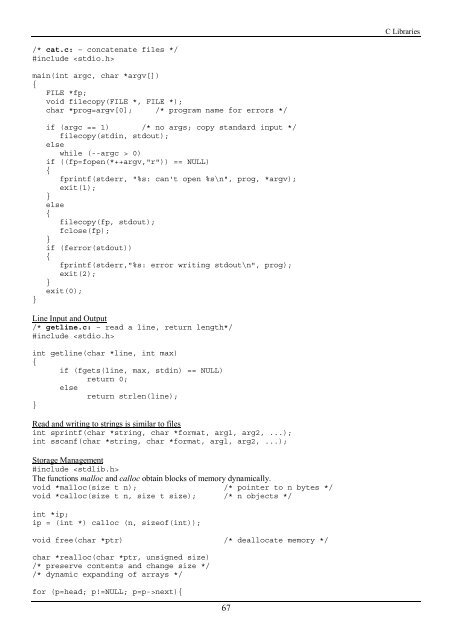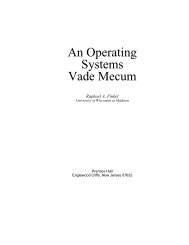Create successful ePaper yourself
Turn your PDF publications into a flip-book with our unique Google optimized e-Paper software.
C Libraries<br />
/* cat.c: – concatenate files */<br />
#include <br />
main(int argc, char *argv[])<br />
{<br />
FILE *fp;<br />
void filecopy(FILE *, FILE *);<br />
char *prog=argv[0]; /* program name for errors */<br />
}<br />
if (argc == 1) /* no args; copy standard input */<br />
filecopy(stdin, stdout);<br />
else<br />
while (--argc > 0)<br />
if ((fp=fopen(*++argv,"r")) == NULL)<br />
{<br />
fprintf(stderr, "%s: can't open %s\n", prog, *argv);<br />
exit(1);<br />
}<br />
else<br />
{<br />
filecopy(fp, stdout);<br />
fclose(fp);<br />
}<br />
if (ferror(stdout))<br />
{<br />
fprintf(stderr,"%s: error writing stdout\n", prog);<br />
exit(2);<br />
}<br />
exit(0);<br />
Line Input and Output<br />
/* getline.c: – read a line, return length*/<br />
#include <br />
int getline(char *line, int max)<br />
{<br />
if (fgets(line, max, stdin) == NULL)<br />
return 0;<br />
else<br />
return strlen(line);<br />
}<br />
Read and writing to strings is similar to files<br />
int sprintf(char *string, char *format, arg1, arg2, ...);<br />
int sscanf(char *string, char *format, argl, arg2, ...);<br />
Storage Management<br />
#include <br />
The functions malloc and calloc obtain blocks of memory dynamically.<br />
void *malloc(size t n); /* pointer to n bytes */<br />
void *calloc(size t n, size t size); /* n objects */<br />
int *ip;<br />
ip = (int *) calloc (n, sizeof(int));<br />
void free(char *ptr) /* deallocate memory */<br />
char *realloc(char *ptr, unsigned size)<br />
/* preserve contents and change size */<br />
/* dynamic expanding of arrays */<br />
for (p=head; p!=NULL; p=p->next){<br />
67
















